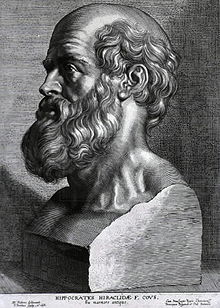Hippocrates of Kos (c. 460 BC – c. 370 BC) was an ancient Greek physician, and is considered one of the most outstanding figures in the history of medicine.
He is referred to as the father of western medicine in recognition of his lasting contributions to the field as the founder of the Hippocratic School of Medicine. This intellectual school revolutionized medicine in ancient Greece, establishing it as a discipline distinct from other fields that it had traditionally been associated with (notably theurgy and philosophy), thus establishing medicine as a profession.
Hippocrates is commonly portrayed as the paragon of the ancient physician, credited with coining the Hippocratic Oath, still relevant and in use today.
He is also credited with greatly advancing the systematic study of clinical medicine, summing up the medical knowledge of previous schools, and prescribing practices for physicians through the Hippocratic Corpus and other works.
Walking is man’s best medicine.
Cure sometimes, treat often, comfort always.
Natural forces within us are the true healers of disease.
Let food be thy medicine and medicine be thy food.
Wherever the art of Medicine is loved, there is also a love of Humanity.
There are in fact two things, science and opinion; the former begets knowledge, the latter ignorance.
If we could give every individual the right amount of nourishment and exercise, not too little and not too much, we would have found the safest way to health.
Whenever a doctor cannot do good, he must be kept from doing harm.
Everything in excess is opposed to nature.
Extreme remedies are very appropriate for extreme diseases.
Prayer indeed is good, but while calling on the gods a man should himself lend a hand.
To do nothing is also a good remedy.
The life so short, the craft so long to learn.
Healing is a matter of time, but it is sometimes also a matter of opportunity
The physician must not only be prepared to do what is right himself, but also to make the patient, the attendants, and externals cooperate.
Those diseases which medicines do not cure, iron cures; those which iron cannot cure, fire cures; and those which fire cannot cure, are to be reckoned wholly incurable.
It is time which imparts strength to all things and brings them to maturity.
It is more important to know what sort of person has a disease than to know what sort of disease a person has.




